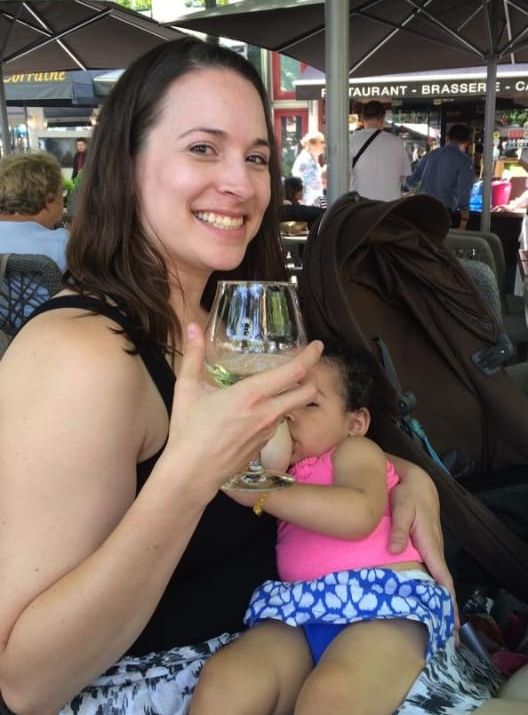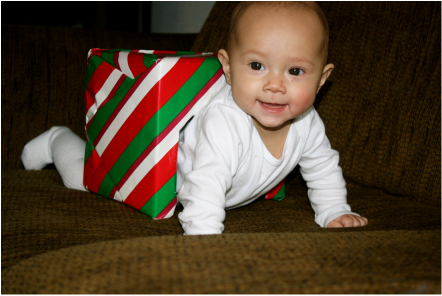|
I often hear moms in the hospital ask, "Besides alcohol, are there other foods (or drinks) I should not have while breastfeeding?". And my reply is always the same: you CAN have alcohol while you're breastfeeding. Now I am not saying go out with reckless abandon, but I want moms and families to realize that breastfeeding is not intended to be restrictive. There are those alcohol test strips sold in stores which, in my personal opinion, are unnecessary. Go by how you feel. If you feel that you can safely drive a car, or hold your baby, it's fine to breastfeed your baby. Jack Newman posted on Facebook a couple of years ago a study done by a mom in a toxicology lab who tested alcohol levels in her milk. The post is below and I feel it does more justice to the topic than I could: Dr.Jack Newman December 21, 2014 · Reposting on alcohol and breastfeeding. Happy holidays all. Since the holidays are imminent, even started, many of you may want to have a couple of alcoholic drinks. You do not have to "pump and dump" (a terrible expression) afterwards and you don't have to wait a certain time after your more recent drink in order to restart breastfeeding. The amount of alcohol that gets into the milk is tiny and will not hurt the baby. Think of it this way, in most jurisdictions, you are too impaired to drive if you have 0.05% alcohol in your blood. Alcohol appears in the milk in the same concentration as in the blood. Thus if you have 0.05% alcohol in your blood you will have 0.05% alcohol in your milk and as it decreases in your blood, it will decrease in your milk. Even de-alcoholized beer sold in my local store has 0.6% alcohol, more than 10x more than the breastmilk will contain if it contains 0.05% alcohol. I am not saying it's fine to get falling down drunk because if you are breastfeeding, you must not drop the baby, but the problem is your coordination not the amount of alcohol in the milk. Also from last year: The following is from a blog by a mother who tested her milk for alcohol. Not one of those useless kits that you can buy at various stores, but tested at a toxicology laboratory. I will copy from her blog the method she used and the results. I think this puts the lie to the notion that women should not drink while breastfeeding or need to "pump and dump" (an appalling term) after having even one drink. The following is an exact quote from her blog: Method: First I took a sample of my milk (about 1 mL) prior to drinking any alcoholic beverage. I expressed the milk mid-nursing session to ensure I had a goodly portion of fore & hind milk. After completing the nursing session, I mixed myself an alcoholic beverage consisting of 2 oz of 80 proof (40%) vodka in 10 oz of soda (Sprite). I proceeded to drink the entire 12 oz in about 30 minutes. About 30 minutes after finishing (1 hour after beginning to drink), I expressed some milk (about 1 mL) and labeled it 'immediate'. I then waited 1 hour and expressed more milk (about 1 mL) and labeled it '2 hours'. In the 2 hours (from the beginning), I did not drink any more alcoholic beverages, drink other beverages, or eat any other foods. Another day, 1/2 of a beer (4.3% alcohol) and 2-6 oz glasses of wine were consumed within 1.5 hours. About an hour from the beginning of the last drink, a milk sample (about 1 mL) was taken. This sample was labeled '1 hour - 3 drinks'. Another sample was taken about an hour after that (2 hours after the beginning of the last drink). This sample was labeled '2 hours - 3 drinks'. The samples were stored in the refrigerator until processing. An Agilent headspace instrument was used to run the tests. Propanol and ethanol standards were also tested to ensure the instrument was within limits. The instrument is maintained by the KSP Lab Toxicology Section and used in forensic determinations of blood and urine alcohol content. Results: The sample labeled as 'immediate' registered as 0.1370 mg/mL which correlates to 0.01370% alcohol in the sample. The sample labeled '2 hours' registered as 0.0000 mg/ml which correlates to 0.0000%. The sample labeled '1 hour - 3 drinks' registered as 0.3749 mg/mL which correlates to 0.03749% alcohol in the sample. The sample labeled '2 hours - 3 drinks' registered as 0.0629 mg/mL which correlates to 0.00629% alcohol in the sample. Conclusion: The alcohol content in breast milk immediately after drinking is equivalent to a 0.0274 proof beverage. That's like mixing 1 oz of 80 proof vodka (one shot) with 2919 oz of mixer . By the way, 2919 oz is over 70 liters. Two hours after drinking one (strong) drink the alcohol has disappeared from the sample. Completely harmless to the nursing infant. Drinking about 3 drinks in 1.5 hours resulted in higher numbers, but still negligible amounts of alcohol would be transferred to the child. One hour after imbibing in 3 drinks, the milk was the equivalent of 0.07498 proof beverage. That would be like adding 1 oz of 80 proof vodka (one shot) to 1066 oz of mixer (1066 oz is over 26 liters). Two hours after imbibing in 3 drinks, the milk was 0.01258 proof. That would be like adding 1 oz of 80 proof vodka to 3179 oz of mixer (over almost 80 liters). So, even though an infant has much less body weight, any of these percentage of alcohol in breast milk is unlikely to adversely affect the baby. However, all that said, if you aren't sure how you may react to alcohol (especially if it's been 9+ months since your last drink), it may be best to have a little milk stored in the refrigerator or freezer should you not feel comfortable breastfeeding. If you decide to use your expressed milk to feed baby, just be sure you pump/express so your body doesn't think you missed a feeding. And, please be sure you're not under the influence of alcohol if you bedshare.
0 Comments
Yes, it's a thing. The holiday season is one of the busiest times of the year with moms feeling pulled in many, many different directions - cooking, planning, buying gifts, traveling, coordinating - and that's in addition to the usual daily tasks of childcare, meal-planning, cleaning, and general household upkeep.
Needless to say, moms can feel overwhelmed during the holidays. It's easy to try to hold baby off from feeding so you can finish your holiday baking or hand baby off to a visiting relative so he or she can enjoy some baby snuggles (because really - who turns down baby snuggles??). Or maybe Aunt Josie offers to give baby a bottle so you can get some rest or clean the house. Perhaps there's a holiday party you want to go to. All of these activities, while they seem harmless, if done repeatedly may inadvertently send baby a message that he's being put off or getting his meals from another source. Baby may start to seem less interested in breastfeeding or possibly even go on a nursing strike. Moms may interpret the lack of interest in breastfeeding as baby starting to wean, but that's most likely not the case. It's important to keep breastfeeding up during the busy holidays and maintain that bond with your baby. In addition to making sure baby's needs are met, continuing to feed frequently will help ensure that moms don't get plugged ducts or mastitis (both of these are especially common in the busy holiday season!). Here are 5 tips to help prevent accidental holiday weaning:
|
AuthorJust Carrie wanting a space to write about being a mom to 2, boob nerd, military wife, and food enthusiast. But mainly a place to talk about boobs and babies! Archives
March 2019
Categories |
|
LOCATION
Olympia Office (effective April 2024):
2627 Martin Way E, Olympia WA 98506 Pierce County: Appointments available in Steilacoom - see schedule page for details and availability! Providing lactation consults to families in Olympia, Lacey, Tumwater, Steilacoom, DuPont, Grays Harbor, Yelm, Rainier, and surrounding areas. |
|
We support equal rights and inclusion. LGBTQIA+ friendly.


 RSS Feed
RSS Feed


